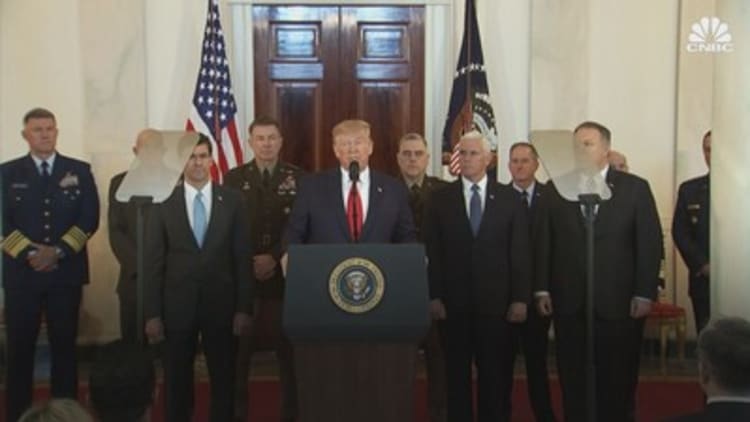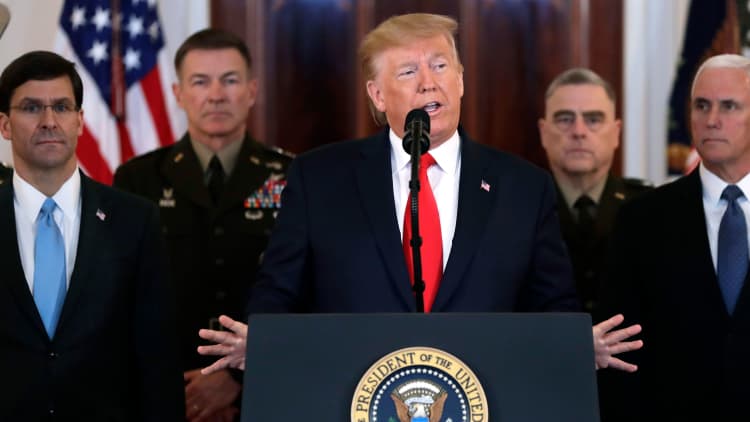The Trump administration made its case on Capitol Hill for killing a powerful Iranian general, but Democrats said Wednesday's classified briefings were short on details and left them wondering about the president's next steps in the volatile Mideast.
Democrats said that by not disclosing many details of the threat that prompted the U.S. to kill Iranian Gen. Qasem Soleimani, President Donald Trump is asking the American public to trust the very intelligence reports he has often disparaged.
Top Trump administration officials have repeatedly stressed that the undisclosed intelligence about imminent threats to Americans in the Mideast required action — that the president would have been negligent not to strike Iran. But Democrats want more information about what led Trump to kill Soleimani — a man whose hands were "drenched in both American and Iranian blood," according to Trump.

"Trust us. That's really what it all boils down to," Rep. Eliot Engel, D-N.Y., the chairman of the House Foreign Affairs Committee, said after the classified briefing by top administration officials.
"But I'm not sure that 'trust me' is a satisfactory answer for me," Engel said. He added that his committee would hold hearings next week "to try to get to the bottom of this."
Democrats also are skeptical of the timing of the strike, which comes in the run-up to a Senate impeachment trial and at the start of a presidential election year. It's the same skepticism that some Republicans expressed in 1998 when they accused President Bill Clinton of using military strikes on Iraq to interrupt and delay a pending impeachment resolution against him.
Trump administration officials this week gave the top four leaders in the House and Senate and the chairmen and vice-chairmen of the intelligence committees of both chambers a classified briefing about the intelligence that prompted Trump to order the fatal strike against Soleimani.
Other lawmakers, including Engel, received less-detailed, classified briefings Wednesday. A top defender of the president, Rep. Mark Meadows, R-N.C., said afterward that "there's no question" the killing was justified.
Democrats weren't convinced.
Rep. Bonnie Watson Coleman, D-N.J., said she learned nothing from the briefing about Trump's strategy in the region. "I heard more historical perspective ... as opposed to being able to give us the evidence of what was the reason for reacting as they did, now."
Rep. Gerry Connolly, D-Va., called the briefing "profoundly unconvincing" and said "no case was made" that the Iranian attacks were imminent. "I leave this (briefing) more troubled than I went into it."
The White House also has ignored calls to declassify the written notification that Trump sent to Congress after the military operation, as required by the 1973 War Powers Act. Some lawmakers have said it was "vague" and inconsistent with details other administrations have provided Congress about military operations. They wondered why it had to be classified in the first place.

One lawmaker, who has read the classified notification Trump sent Congress, and another individual familiar with it said the two-page document did not describe any imminent, planned attacks or contain any new information. The lawmaker, who spoke on condition of anonymity to describe the classified document, said the letter gave a historic account of past attacks that have been reported publicly.
It's unclear if more detailed information about the intelligence that led to the strike on Soleimani will ever be publicly released.
"Whereas the gravity of the situation requires a clear explanation of the Iranian threat to Congress and the public, disclosure of any possible classified information does risk exposing sources and methods which could then leave us blind to Iran's next threat to U.S. lives,"′ said Norman Roule, former national intelligence manager for Iran at the Office of the Director of National Intelligence.
The lack of casualties from Iran's retaliatory strikes Tuesday on Iraqi bases housing American troops could tamp down Democrats' demand for more information, but it might not silence critics who think Trump only embraces U.S. intelligence that fits his agenda.
While in office, Trump has repeatedly disagreed or refused to accept U.S. intelligence assessments on a range of key national security topics, including Russian interference in the 2016 presidential election, Iran's compliance with the nuclear deal and the role of Saudi Crown Prince Mohammed bin Salman in the 2018 assassination of journalist Jamal Khashoggi.
Trump's past jabs at intelligence reports were noted this week by two conservative personalities on Fox News Channel, Tucker Carlson and Sean Hannity, who are among Trump's favorite commentators.
Carlson questioned the reliance on intelligence as justification to strike Soleimani, saying, "It seems like just 20 minutes ago we were denouncing these same people as 'the deep state' and pledging never to trust them again without verification," Carlson said on Monday night's show. "But now, for some reason, we do seem to trust them implicitly and completely."
Hannity, whose show directly follows Carlson's, offered a typically full-throated defense of the president Monday. He said the U.S. has the most powerful and sophisticated military in the world along with the "greatest intelligence agencies."

